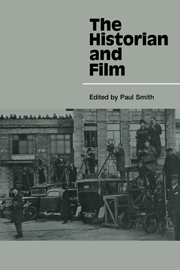Book contents
- Frontmatter
- Contents
- Preface
- The contributors
- Introduction
- I The raw material
- II Film as historical evidence
- III Film as historical factor
- IV Film in the interpretation and teaching of history
- 6 The historian as film-maker I
- 7 The historian as film-maker II
- 8 Film in university teaching
- 9 Film in the classroom
- 10 History on the public screen I
- 11 History on the public screen II
- Select bibliography
- Appendix: addresses of organisations involved with film and history
- Index
7 - The historian as film-maker II
Published online by Cambridge University Press: 05 November 2011
- Frontmatter
- Contents
- Preface
- The contributors
- Introduction
- I The raw material
- II Film as historical evidence
- III Film as historical factor
- IV Film in the interpretation and teaching of history
- 6 The historian as film-maker I
- 7 The historian as film-maker II
- 8 Film in university teaching
- 9 Film in the classroom
- 10 History on the public screen I
- 11 History on the public screen II
- Select bibliography
- Appendix: addresses of organisations involved with film and history
- Index
Summary
It is an extraordinary fact that until the late 1960s no professionally trained historian had attempted to ‘write’ history through the medium of sound films. Plenty of films existed dealing with historical subjects, but none were made by historians. The very competence of the historian to make his own films was challenged from two directions. The professional film producers argued that the predominant skill required in the making of a film was the craft of film-making itself and that the subject matter of the film was therefore of necessity subsidiary to it. When applied to films purporting to be contributions to history this meant that the historian, when consulted, had to fulfil a subsidiary role in the production of the film. He was consulted, sometimes even asked to submit a script, but his advice was not necessarily followed when it conflicted with the needs and views of the professional film-maker. The producer was in charge, and the producer was never a professional historian and according to the argument never could be, because professional historians lacked the necessary creative and technical skills.
The public appetite for history on film nevertheless was immense. Since the pioneering days of the Great War television documentary, British television has catered for it, though standards, judged from the historian's point of view, have been declining rather than improving. This is history, so called, intended to provide entertainment and to attract a mass viewing audience. It has to be simplified and the spoken introductions presented by stars of the media. It is often rhetorical in style and banal in judgement.
- Type
- Chapter
- Information
- The Historian and Film , pp. 132 - 141Publisher: Cambridge University PressPrint publication year: 1976



